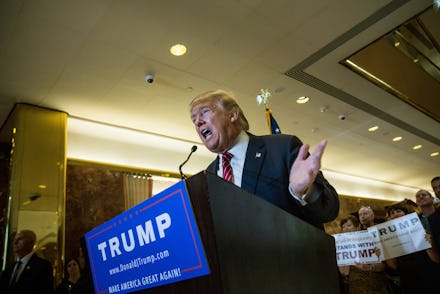Donald Trump taxes: Polls suggest this could be his "47%" moment

When the New York Times released its bombshell report that Donald Trump may have paid no federal income tax for 18 years, the billionaire went more off script than usual at a Pennsylvania campaign rally. In a state where Clinton leads Trump, he accused the Democrat of marital infidelity, said she is "crazy" and imitated her fainting in September.
No one ever knows exactly why Trump launches into a tirade. But unlike dozens of other negative revelations about Trump, Saturday's rage may have been driven by knowledge that the New York Times story could be a watershed moment.
Alicia Machado. The Trump Foundation. The Khan feud. PTSD among veterans. Failed casinos. All these recent Trump scandals share a theme: They are complicated enough the GOP presidential nominee can twist the facts to say he was misquoted or wrongly attacked. While frequently lying, Trump spins scandals into narratives many of his supporters believe.
But Trump's taxes may be different. Why? Because just like Mitt Romney's "47%" comment to donors in 2012, when the then-GOP nominee denigrated Americans who wouldn't "take personal responsbility" in their lives, the revelation that Trump has avoided being taxed is easy to understand.
Public opinion
The man who drew the most votes ever cast in a Republican presidential primary loves to cite his support among voters. But avoiding taxes is not an issue where voters are on his side.
In a CNN/ORC poll conducted before the New York Times story, 86% of likely and registered voters agreed "it is every American's civic duty to pay their fair share of taxes." With an estimated net worth of $3.7 billion, it is hard to imagine many voters would believe paying zero taxes is Trump's "fair share."
In 2012, Mother Jones released a video of Romney telling donors that "47%" of the American electorate would support President Barack Obama because they felt entitled to government services. The mid-September release of the video sent shockwaves through coverage of the election. Romney's exact words:
There are 47% of the people who will vote for the president no matter what. All right, there are 47% who are with him, who are dependent upon government, who believe that they are victims, who believe the government has a responsibility to care for them, who believe that they are entitled to health care, to food, to housing, to you-name-it. That that's an entitlement. And the government should give it to them. And they will vote for this president no matter what... These are people who pay no income tax.
Obama's campaign made sure every voter heard Romney's thoughts on nearly half the country. With this statement as a backdrop, Obama painted Romney as a wealthy, corporate raider who was woefully out-of-touch with working-class Americans. That message helped guarantee Romney's failure to win swing states like Ohio and Pennsylvania.
In May, a Washington Post/ABC poll found white Americans without a college degree favored Trump over Clinton by 40 percentage points. At the same point in 2012, they favored Romney over Obama by 24 points. While Trump has bases of support beyond the working class, his campaign has aimed to increase his margins among the segment of white, working-class voters who have traditionally supported Democrats.
More to lose
This brings us back to the possibility that Trump paid no federal income tax for nearly two decades. While Trump continued to amass wealth — Forbes estimates his wealth has grown from hundreds of millions of dollars in the 1990s to billions of dollars now — a $916 million loss he took in 1995 may have insulated him from income tax. The cause of that loss: Poor management of his casinos.
Meanwhile, wage growth has been a struggle for most Americans. Tens of millions of people live in poverty. And the U.S. has seen a long, continued decline in manufacturing jobs. Because a large majority of Americans believe taxes must be paid, Trump may be in trouble with his base — along with any remaining independent voters.
Trump's campaign neither confirmed nor denied the New York Times story. Instead, the campaign reiterated what Trump said at the presidential debate: He followed the law.
If working-class voters, especially white men, become alienated by Trump's lack of paying taxes, the billionaire may have more to lose. The latest CNN/ORC poll also found Clinton gaining on Trump in support among white men. In early September, she trailed him among those voters by 22 points. Now, she's only down by five points.
This is far from Trump's only public opinion problem. Clinton is enjoying a post-debate polling bump. And more than a week after the debate, with about a month till election day, more voters have a negative impression of Trump.
Just as Obama did with Romney's "47%" comment, Clinton has already seized the political opportunity Trump provided.
Throughout Trump's run for the White House, the story of the latest scandal signaling his demise has been written many times. But never before have the facts been so plainly laid in front of voters: While you paid taxes each year, Trump made millions of dollars and may have paid nothing.
Mic has ongoing presidential coverage. Please follow our main election hub as well as coverage of Donald Trump and Hillary Clinton.